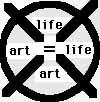

I had been painting pretty hard in 1984 and 1985, and had acquired a certain amount of technical facility and an aesthetic. The aesthetic had to do with working in the dark. I would go to the library, close my eyes, spin around and get lost, and then choose books. I kept the ones with dark bands visible on the top. That meant they had pictures, and those became the random source material for my paintings. I would turn off the lights in my studio and use the art department's opaque projector to cast the images onto the canvas. I wouldn't look at where the images would fall, and I chose the images by chance. I edited later.
When I was done with the MFA and the studio at the University, I moved into the first of a series of several basement studios. I was tired of painting, but I had lots of art energy. I liked the dark of the basement studio. I started getting devices at thrift stores, and attacking them in a pseudo-scientific frenzy. I have never known that much about electronics, so I thought that working with electronic devices was a great way of working in the dark. I felt like an explorer; a discoverer. The machines were unknown to me, even if others did understand them. I had a belief that once I had mastered one craft, (painting), that I could transfer my aesthetic to any other medium. So I took up writing, sound art, performance and sculpture. Those media all got mushed up together in performance/installation pieces, always with plenty of machines involved.
I thought: here we are, at the end of the machine age, at the beginning of the information age. This stuff is available, so we should be using it. Just as Paleolithic hunters made images of mammoth and held rituals of death and renewal deep in their caves, so I, in my basement will ritually dissect and recreate these mechanical artifacts. The ice age hunters sought to magically control the huge and terrifying animals that they needed for food, and like them we need to take back control over the machines that we depend on for our livelihoods, food preparation, entertainment, etc. My way is by making them into art: something more fragile, beautiful, pathetic and humane than the articles that come to us new from department store shelves.
So I did. I worked hard on my machines, the collection grew as I hauled them from one studio to the next, from Salt Lake to San Francisco. As I worked, some things changed. As my expertise grew, my ability to surprise myself diminished. I was no longer working in the dark. Certain artifacts became old friends, used over and over in different ways, in different situations. Other artifacts remained untouched, too "good" to be deconstructed. Both sorts of items became too precious to be of much use to me. Socially, the information age began in earnest, and with that, the power of the mechanical device began to wane. Collaborative art, events and collectives became more interesting than work produced by an artist working in isolation. As internet is replacing TV, so is the decentralized model of the community network replacing the centralized model that typifies performance/audience relations and the gallery with its separation between artist, viewer and artwork. Art is becoming a "participants only" experience.
So I'm recycling my pile of machines. Please take one, take as may as you wish. I have moved my studio from a private basement to a very public warehouse. I want to get past this part of my artistic life, but I don't want it to pass unheralded. I want to celebrate it with friends, so I am glad you came to this small event. It is a catharsis, it is a wake; not just for my stuff, or a for an artistic style, but for the machine age, which is looking more innocent and naive as we view it from an increasing distance.
It wasn't.
Larnie Fox
5/20/98